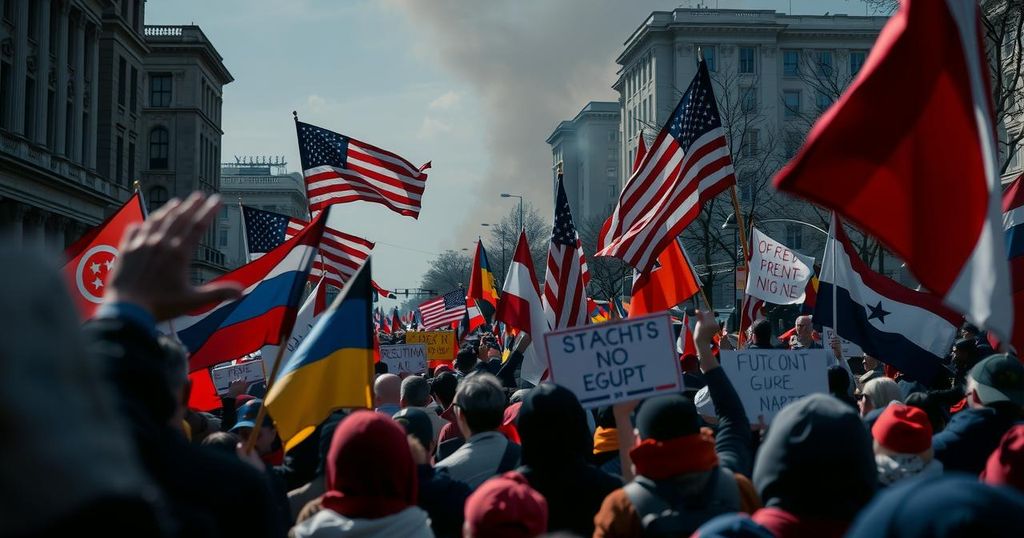Intelligence Officials Alert on Potential Foreign Influence in U.S. Post-Election Protests
U.S. intelligence officials warn that Russia and Iran may instigate violent protests following the elections, potentially undermining democratic processes. A memo indicates both countries may support protests to sow discord and challenge election results. This follows previous instances of foreign efforts to manipulate American sentiments, exacerbated by lessons from the January 6 Capitol attack, raising concerns about political violence and election integrity.
Senior intelligence officials have issued a warning regarding potential manipulation by Russia and Iran, suggesting that these nations may instigate violent protests in the United States following the upcoming elections. A declassified memo released by the Office of the Director of National Intelligence outlines concerns that both countries may covertly organize and support protests with the intent of engendering division, casting doubt on the legitimacy of the election results, and complicating the transition of power. The memo cites incidents where foreign intelligence agencies have attempted to sow discord in domestic affairs in the past. In one instance, Russian military intelligence allegedly sought to recruit an American individual to facilitate protests, reportedly without the individual’s knowledge of the Russian involvement. Similarly, the Iranian government is accused of covertly backing protests tied to U.S. support for Israel during conflicts in Gaza, even offering financial assistance for travel to such protests in Washington, D.C. These possibilities give rise to increased risk surrounding election certification, exacerbated by the lessons learned from the January 6, 2021 insurrection at the Capitol, during which misleading claims about electoral integrity incited violence. Given the evolving landscape of foreign influence and misinformation, American adversaries may leverage digital propaganda to undermine trust in the electoral system and the socio-political fabric of the nation. Russia is anticipated to exploit tensions irrespective of the election outcome, although officials indicated a likelihood of intensified efforts should Vice President Kamala Harris win against former President Donald Trump. Iran’s historical fabrications and cyber intrusions aimed at discrediting Trump further compound the likelihood of external interference. Intelligence analysts also acknowledge that while China has engaged in disinformation efforts, there is no indication of its intention to incite physical violence. In light of these threats, various organizations advocating for voting rights and public engagement are ramping up initiatives to combat misinformation and reassure the electorate that the power to influence election results lies squarely with the voters. Emphasizing unity and resilience in the face of disinformation, advocates highlight the fundamental tenets of democracy necessitate continual vigilance amidst attempts to sow division. As the situation evolves, Russian, Iranian, and Chinese officials have categorically denied allegations of interference in American elections. Nonetheless, the potential for foreign influence and domestic extremist actions in the forthcoming electoral process remains a grave concern.
The topic at hand addresses the concerns raised by U.S. intelligence officials regarding the potential involvement of foreign adversaries, specifically Russia and Iran, in inciting unrest and violent protests in the aftermath of the upcoming elections. The memo from the Office of the Director of National Intelligence outlines how these nations could leverage existing divisions within the American populace, especially given the events surrounding the January 6 Capitol riot, to further their own geopolitical agendas. Both countries have demonstrated capabilities and intentions to manipulate domestic sentiments, with implications for political stability during critical moments, such as the post-election period. In recent years, the United States has faced significant challenges from foreign entities attempting to meddle in its political processes through disinformation campaigns and exploitative tactics aimed at undermining public confidence in elections.
In conclusion, the warnings from U.S. intelligence officials highlight a significant threat from foreign adversaries, particularly Russia and Iran, who may attempt to stoke violence and discord following the upcoming elections. The evolving dynamics of misinformation and the lessons learned from past events underscore the vulnerabilities within the American electoral system. To counteract this threat, it is essential for voters and advocacy groups to remain vigilant against disinformation while promoting unity and resilience in preserving democratic values. As foreign nations deny any interference, the focus remains on protecting democratic integrity and ensuring that the outcomes are determined by the electorate rather than external forces or misinformation campaigns.
Original Source: apnews.com




Post Comment